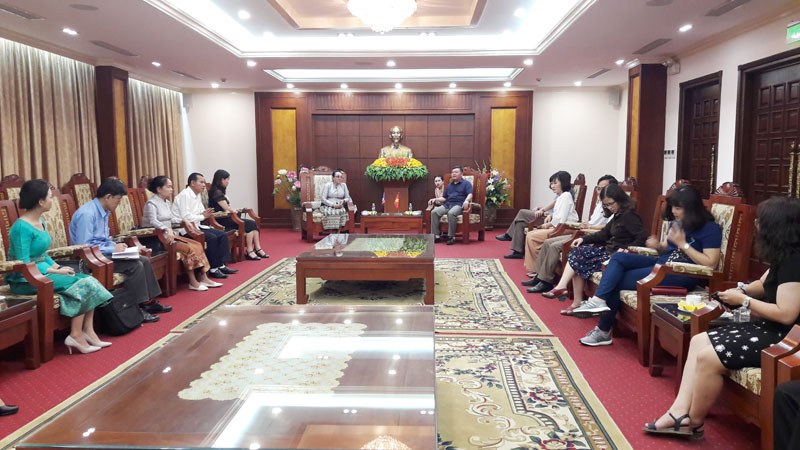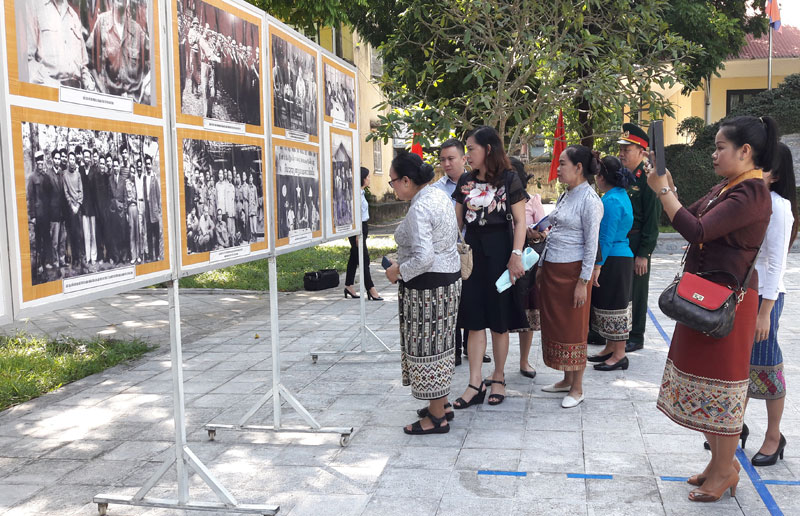
(HBO) – A delegation from the Archives Department of the Office of the Lao People’s Revolutionary Party (LPRP) Central Committee led by its head Nangsiengkham Phommavongsa paid a working visit to Hoa Binh province on October 15. The Lao guests were received by Nguyen Dong, member of the provincial Party Committee and Chief of the committee’s Office, leaders and experts from the office, and representatives from the provincial Military High Command.
Leaders of the Office of the
provincial Party Committee receive and hold working session with the Lao
delegation.
The delegation from the Archives Department of
the Office of the LPRP Central Committee visits the National Historical Relic
Site, where the second Congress of the Lao People’s Party took place.
At the working session, Nguyen Dong, member of
the provincial Party Committee and Chief of the committee’s Office, briefed his
guests on the province’s socio-economic development situation in the first nine
months of this year as well as archives activities of the provincial Party
Committee over the past time. He highlighted the profound friendship and close
relationship between Vietnam and Laos over the past years.
Nangsiengkham Phommavongsa, head of the Archives
Department of the Office of the LPRP Central Committee, expressed his pleasure
to visit Hoa Binh province. He spoke highly of the development and great
achievements the province has recorded in the past years. He wished that the
fine relationship between Laos and Vietnam in general and Hoa Binh in
particular will be further consolidated.
On the same day, the Lao delegation visited the
National Historical Relic Site, where the second Congress of the Lao People’s
Party took place in the campus of the provincial Military High Command and
noted his feelings in the site’s traditional golden book. Over the past years,
the relic site has contributed to popularizing and educating the two countries’
young generations about the revolutionary tradition and the Vietnam-Laos
special friendship in the struggle for national liberation and socialism
building, thus fostering the bonds between the two countries’ Parties, States
and people.
Within the framework of the working trip, the delegation
visited the Kim Boi Hot Spring and the nursing centre for people who rendered
service to the nation in Kim Boi district./.
Hoa Binh province is undergoing a dynamic transformation amid Vietnam’s national digital transition. Building on Poliburo’s Resolution No. 57-NQ/TW on breakthroughs in science, technology, innovation, and national digital transformation, the province has rolled out a wide range of practical action plans. A standout initiative is the "Digital Literacy for All” movement, an effort to ensure that no one is left behind in the digital era.
Hoa Binh province is undergoing a dynamic transformation in the wake of the national digital transformation movement. Building on Resolution No. 57-NQ/TW of the Politburo on breakthroughs in science, technology, innovation, and national digital transformation, the province has implemented a wide range of practical action plans. A standout initiative is the "Digital Literacy for All” movement ambitious effort to ensure that no one is left behind in the digital age.
With a spirit of unity and proactive problem-solving, the Party Committee, the government and the people of Dong Lai Commune (Tan Lac District) have made great strides in implementing the resolutions of the 24th Party Congress of the commune for the 2020 - 2025 term. Focusing on leadership and practical actions, the commune has brought the Party’s resolutions into daily life, creating strong impacts and pushing the local development forward.
Amid the nationwide push for digital transformation, young people in Hoa Binh Province are stepping up as dynamic pioneers, applying technology to enhance Youth Union operations and expand the reach of youth-led initiatives. Through creativity and adaptability, Youth Union organizations at all levels have introduced a series of practical solutions, contributing to modern governance and community development.
In recent years, An Nghia commune, located in Lac Son district, has stepped up administrative reform, focusing on improving the quality and efficiency of its single-window service unit for receiving and processing administrative procedures. These improvements have helped create favourable conditions for local residents and organisations to handle administrative procedures, contributing to the commune’s broader socio-economic development.
The Prime Minister-approved master plan to develop the multi-use value of forests ecosystems through 2030, with a vision to 2050, aims to improve the management and sustainable use of forest resources, create jobs, increase incomes, and improve the living standards of ethnic minorities, people in mountainous and remote areas, forest workers and those living near forests.




